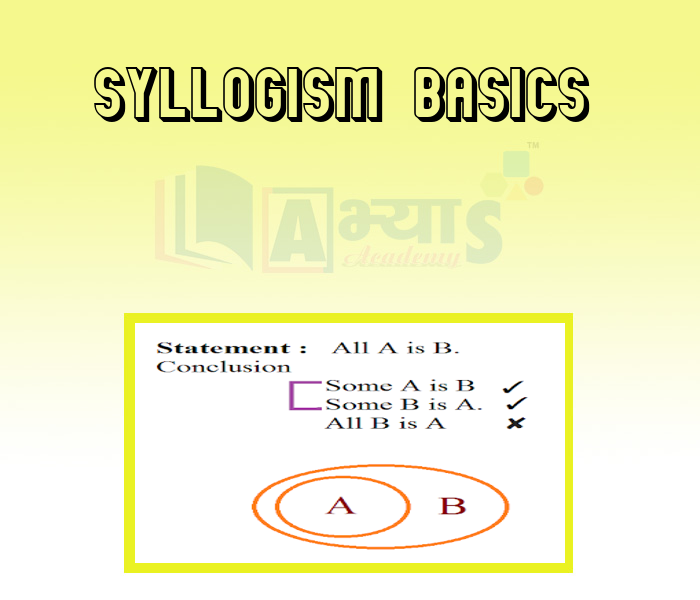Syllogism Basics








Syllogism Basics
Syllogism or Logic Basics: In Logic, any categorical statement is termed as the Proposition.
A Proposition (or a categorical statement) is a statement that asserts that either a part of or the whole of, one set of objects
The set identified by the subject term in the sentence expressing that statement - either is included in, or is excluded from, another set that is the set identified by the predicate term in that sentence. The standard form of a proposition is :
Quantifier + Subject + Copula + Predicate
Thus, the proposition consists of four parts :
Illustrations: Here are certain propositions and their parts.
1. All men are animals.
All (Quantifier) Men (Subject) Are (Copula) Animals (Predicate)
2. Some pens are erasers.
Some (Quantifier) Pens (Subject) Are (Copula) Erasers (Predicate)
Four Fold Classification of Propositions : - A proposition is said to have a universal quantity if it begins with a universal quantifier, and a particular quantity if is begins with a particular quantifier. Besides, propositions which assert something about the inclusion of the whole or a part of one set in the other are said to have affirmative said to have a negative quality. Also, a term is distributed in a proposition if it, refers to all members of the set of objects denoted by that term. Otherwise, it is said to be undistributed. Based on the above facts, propositions can be classified into four types :
1. Universal Affirmative Proposition (denoted by A) : - It distributes only the subject i.e., the predicate is not interchangeable with the subject while maintaining the validity of the proposition e.g.,
All snakes are reptiles.
This is proposition A since we cannot say 'All reptiles are snakes'.
2. Universal Negative Proposition (denoted by E) : - It distributes both the subject and the predicate i.e., an entire class of predicate term is denied to the entire class of the subject term, as in the proposition. e.g.,
No boy is intelligent.
3. Particular Affirmative Proposition (denoted by I) : - It distributes neither the subject nor the predicate e.g.,
Some men are foolish.
Here, the subject term 'men' is used not for all but only for some men and similarly the predicate term 'foolish' is affirmed for a part of subject class. So, both are undistributed.
4. Particular Negative Proposition (denoted by O) : - It distributes only the predicate. e.g.,
Some animals are not wild.
Here, the subject term 'animals' is used only for a part of its class and hence is undistributed while the predicate term 'wild' is denied in entirety to the subject term and hence is distributed.
These facts can be summarized as follows :
| Statement Form | Quantity | Quality | Distributed |
|---|---|---|---|
| (A) : All S is P. | Universal | Affirmative | S only |
| (E) : No S is P. | Universal | Negative | Both S and P |
| (I) : Some S is P. | Particular | Affirmative | Neither S nor P |
| (O) : Some S is not P. | Particular | Negative | P only |
Students / Parents Reviews [10]
Being a parent, I saw my daughter improvement in her studies by seeing a good result in all day to day compititive exam TMO, NSO, IEO etc and as well as studies. I have got a fruitful result from my daughter.

Prisha Gupta
8thAbhyas is a complete education Institute. Here extreme care is taken by teacher with the help of regular exam. Extra classes also conducted by the institute, if the student is weak.

Om Umang
10thOne of the best institutes to develope a child interest in studies.Provides SST and English knowledge also unlike other institutes. Teachers are co operative and friendly online tests andPPT develope practical knowledge also.

Aman Kumar Shrivastava
10thIt has a great methodology. Students here can get analysis to their test quickly.We can learn easily through PPTs and the testing methods are good. We know that where we have to practice

Barkha Arora
10thI have spent a wonderful time in Abhyas academy. It has made my reasoning more apt, English more stronger and Maths an interesting subject for me. It has given me a habbit of self studying

Yatharthi Sharma
10thMy experience with Abhyas is very good. I have learnt many things here like vedic maths and reasoning also. Teachers here first take our doubts and then there are assignments to verify our weak points.

Shivam Rana
7thAbout Abhyas metholodology the teachers are very nice and hardworking toward students.The Centre Head Mrs Anu Sethi is also a brilliant teacher.Abhyas has taught me how to overcome problems and has always taken my doubts and suppoeted me.

Shreya Shrivastava
8thAbhyas Methodology is very good. It is based on according to student and each child manages accordingly to its properly. Methodology has improved the abilities of students to shine them in future.

Manish Kumar
10thMy experience was very good with Abhyas academy. I am studying here from 6th class and I am satisfied by its results in my life. I improved a lot here ahead of school syllabus.

Ayan Ghosh
8thIt was a good experience with Abhyas Academy. I even faced problems in starting but slowly and steadily overcomed. Especially reasoning classes helped me a lot.
